Identification of Pathogenecity of Avian Influenza Virus Subtype H5N1 from Waterfowls Base on Amino Acid Sequence of Cleavage Site Hemagglutinin Protein
R. Susanti(1*), Retno D. Soejoedono(2), I Gusti Ngurah K Mahardika(3), Wayan T I Wibawan(4), Maggy T Suhartono(5)
(1)
(2)
(3)
(4)
(5)
(*) Corresponding Author
Abstract
Identification of pathotype of Avian Influenza Virus (AIV) subtype H5N1 isolates is very important. This
research aimed to identify the pathotype of AIV subtype H5N1 isolated from household waterfowls in West Java
based on molecular markers of amino acid sequences of the Hemagglutinin (HA) cleavage site. Fragments of HA
genes of 21 isolates were amplified using RT-PCR with a primer pair that flanking the cleavage site region, and
sequenced with dideoxy-termination method with ABI automatic sequencer (Applied Biosystems). Multiple alignment
of nucleotide and their deduced amino acid sequence were analyzed using ClustalW from MEGA 3.1 program.
The result shows that all H5N1 isolates (21 isolates) possess polybasic cleavage sites with 2 patterns of
amino acid sequence, i.e QRERRRKKR (20 isolates) and QRESRRKKR (1 isolate). This finding indicates that all of
the viruses isolated in this research were of highly pathogenic avian influenza (HPAI) strains.
Keywords: cleavage site, waterfowls, HPAI
research aimed to identify the pathotype of AIV subtype H5N1 isolated from household waterfowls in West Java
based on molecular markers of amino acid sequences of the Hemagglutinin (HA) cleavage site. Fragments of HA
genes of 21 isolates were amplified using RT-PCR with a primer pair that flanking the cleavage site region, and
sequenced with dideoxy-termination method with ABI automatic sequencer (Applied Biosystems). Multiple alignment
of nucleotide and their deduced amino acid sequence were analyzed using ClustalW from MEGA 3.1 program.
The result shows that all H5N1 isolates (21 isolates) possess polybasic cleavage sites with 2 patterns of
amino acid sequence, i.e QRERRRKKR (20 isolates) and QRESRRKKR (1 isolate). This finding indicates that all of
the viruses isolated in this research were of highly pathogenic avian influenza (HPAI) strains.
Keywords: cleavage site, waterfowls, HPAI
Full Text:
PDFArticle Metrics
Refbacks
- There are currently no refbacks.
Copyright (c) 2015 Indonesian Journal of Biotechnology









